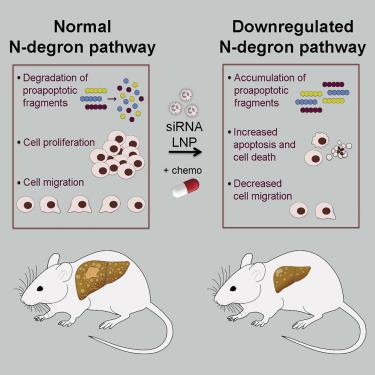当前位置:
X-MOL 学术
›
Mol. Ther.
›
论文详情
Our official English website, www.x-mol.net, welcomes your
feedback! (Note: you will need to create a separate account there.)
Downregulation of the Arg/N-degron Pathway Sensitizes Cancer Cells to Chemotherapy In Vivo.
Molecular Therapy ( IF 12.1 ) Pub Date : 2020-01-21 , DOI: 10.1016/j.ymthe.2020.01.021 Dominique Leboeuf 1 , Tatiana Abakumova 1 , Tatiana Prikazchikova 1 , Luke Rhym 2 , Daniel G Anderson 3 , Timofei S Zatsepin 1 , Konstantin I Piatkov 1
Molecular Therapy ( IF 12.1 ) Pub Date : 2020-01-21 , DOI: 10.1016/j.ymthe.2020.01.021 Dominique Leboeuf 1 , Tatiana Abakumova 1 , Tatiana Prikazchikova 1 , Luke Rhym 2 , Daniel G Anderson 3 , Timofei S Zatsepin 1 , Konstantin I Piatkov 1
Affiliation

|
The N-degron pathway is an emerging target for anti-tumor therapies, because of its capacity to positively regulate many hallmarks of cancer, including angiogenesis, cell proliferation, motility, and survival. Thus, inhibition of the N-degron pathway offers the potential to be a highly effective anti-cancer treatment. With the use of a small interfering RNA (siRNA)-mediated approach for selective downregulation of the four Arg/N-degron-dependent ubiquitin ligases, UBR1, UBR2, UBR4, and UBR5, we demonstrated decreased cell migration and proliferation and increased spontaneous apoptosis in cancer cells. Chronic treatment with lipid nanoparticles (LNPs) loaded with siRNA in mice efficiently downregulates the expression of UBR-ubiquitin ligases in the liver without any significant toxic effects but engages the immune system and causes inflammation. However, when used in a lower dose, in combination with a chemotherapeutic drug, downregulation of the Arg/N-degron pathway E3 ligases successfully reduced tumor load by decreasing proliferation and increasing apoptosis in a mouse model of hepatocellular carcinoma, while avoiding the inflammatory response. Our study demonstrates that UBR-ubiquitin ligases of the Arg/N-degron pathway are promising targets for the development of improved therapies for many cancer types.
中文翻译:

Arg / N-德贡通路的下调使癌细胞对体内化学疗法敏感。
N-degron途径是抗肿瘤治疗的新兴目标,因为它具有积极调节癌症许多特征的能力,包括血管生成,细胞增殖,运动性和存活率。因此,抑制N-德格隆途径提供了成为高效抗癌治疗的潜力。使用小干扰RNA(siRNA)介导的方法选择性下调四种Arg / N-degron依赖性泛素连接酶UBR1,UBR2,UBR4和UBR5,我们证明了细胞迁移和增殖减少,自发凋亡增加在癌细胞中。在小鼠中长期用脂质纳米颗粒(LNP)装载siRNA进行治疗,可有效下调肝脏中UBR泛素连接酶的表达,而无任何明显的毒性作用,但会参与免疫系统并引起炎症。但是,当以较低剂量与化学治疗药物联合使用时,Arg / N-德格伦途径E3连接酶的下调可通过减少肝细胞癌小鼠模型的增殖和增加细胞凋亡来成功减少肿瘤负荷,同时避免炎症反应。我们的研究表明,Arg / N-degron途径的UBR泛素连接酶是开发针对多种癌症的改良疗法的有希望的目标。
更新日期:2020-01-21
中文翻译:

Arg / N-德贡通路的下调使癌细胞对体内化学疗法敏感。
N-degron途径是抗肿瘤治疗的新兴目标,因为它具有积极调节癌症许多特征的能力,包括血管生成,细胞增殖,运动性和存活率。因此,抑制N-德格隆途径提供了成为高效抗癌治疗的潜力。使用小干扰RNA(siRNA)介导的方法选择性下调四种Arg / N-degron依赖性泛素连接酶UBR1,UBR2,UBR4和UBR5,我们证明了细胞迁移和增殖减少,自发凋亡增加在癌细胞中。在小鼠中长期用脂质纳米颗粒(LNP)装载siRNA进行治疗,可有效下调肝脏中UBR泛素连接酶的表达,而无任何明显的毒性作用,但会参与免疫系统并引起炎症。但是,当以较低剂量与化学治疗药物联合使用时,Arg / N-德格伦途径E3连接酶的下调可通过减少肝细胞癌小鼠模型的增殖和增加细胞凋亡来成功减少肿瘤负荷,同时避免炎症反应。我们的研究表明,Arg / N-degron途径的UBR泛素连接酶是开发针对多种癌症的改良疗法的有希望的目标。











































 京公网安备 11010802027423号
京公网安备 11010802027423号